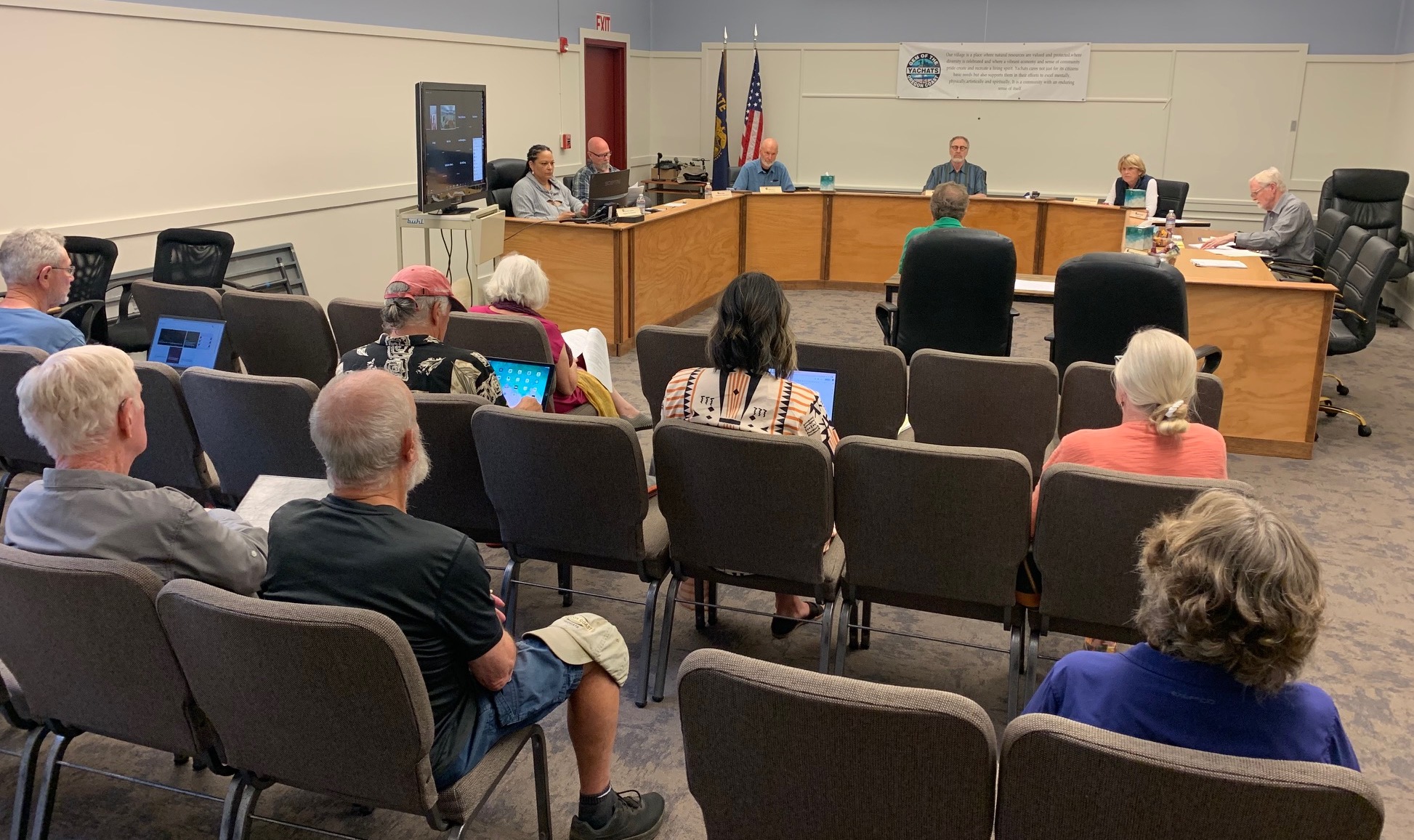
By GARRET JAROS/YachatsNews
The light was green at the Yachats city council meeting Wednesday as councilors put the wheels in motion to pursue a local trolley service, a plan for emergency preparedness, secure a backup water supply, shift its interim city manager to a four-day work week, and codify height limits for fences, walls and hedges.
Despite reservations about operating costs, the city will send a letter of intent to pursue a $100,000 Travel Oregon grant to help fund a tourist-style trolley. The cutoff for signaling intent to seek the grant is Friday.
The 14-passenger hybrid gas-electric trolley, which charges without needing to be plugged in, will provide free round-trip service from Tillicum Beach Hotel to Cape Perpetua with off-highway stops at points in between.
The trolley is the brainchild of the Yachats Area Chamber of Commerce and is intended to help ease congestion and parking in downtown Yachats while also offering a fun and easy way for tourists and locals to move around town and hitch rides from hotels, motels, trails, beaches and homes. It will also provide reservation pickups for people with mobility issues.
The chamber sent its own letter of intent to Travel Oregon to secure another $100,000, which combined with the city’s and funds from transient lodging taxes could go toward the purchase of the $230,000 trolley.

The letter of intent in no way means the trolley is a done deal and the council agreed that more homework needs to be done on its operating costs. Those costs, which include driver, insurance, fuel, standard maintenance and storage are estimated at $150,000 a year if the trolley operates year-round and $50,000 if it operates from Memorial Day to Labor Day.
Initial plans envision the trolley operating year-round from 10 a.m. to 9 p.m. Thursday through Monday.
A clear majority of locals and tourists are on board with bringing a trolley to town based on an online survey (322 respondents as of Wednesday) and a public meeting hosted by the chamber.
Prior to the council’s decision to send the letter of intent, chamber president Linda Hetzler encouraged councilors to move forward despite concerns over operational costs.
“I just really would encourage you guys to be willing to take a little bit of a risk and just commit to going forward and sign the letter of intent and then we’ll just keep working on it and if something really falls apart and doesn’t look like it’s going to work then we will figure out something because I just really believe that this is a really good thing for our community,” Hetzler told the council.
Yachats planning commission co-chair Jacqueline Danos added her support saying having “multi-mobile” options like the trolley helps to get people get out of their cars, and from a planning perspective is a great idea.
Mayor Craig Berdie closed by emphasizing the need to look at ways to reduce operational costs and find funding sources for those costs.
“We have some time but we need to work very diligently on it because it is a big chunk of change on the operational side,” he said.
Inquiries by new council member Barry Collins about purchasing a fully electric trolley were quickly squashed when chamber executive director Bobbi Price informed the council that an all-electric version costs $550,000 and requires a $50,000 charger.
Resiliency study
The city applied for and received a $100,000 grant in June from the Oregon Department of Energy to pay for an energy resiliency study to explore ways the city can weather emergencies that knock out electricity.
The grant revolves around, but is not limited to, using renewable energy sources to electrify a 15-acre hub that encompasses city hall, the library, Commons, wastewater treatment facility, pavilion and park.
The council and interim city manager Rick Sant had initially expressed a bit of confusion about how the grant worked and whether participating in the study would require the city to fork over additional money to see it through.
They were also unsure if accepting the grant, which opens the possibility of applying for an additional $1 million grant to carry out construction, would cost the city millions of additional dollars.
Danos gave a presentation explaining first and foremost that the city is not required by conditions of the grant to kick in so much as a nickel to complete the resiliency study, or chip in for construction costs if it followed up by applying to ODE for the construction grant.

“You do not have to match funds on this grant,” Danos said. “That doesn’t mean there might not be additional costs. We might have staff time costs. There’s always the possibility when you are doing work like this that there is going to be some additional costs.”
What the city can do with the planning grant though is design and scope a larger project that pulls in funding from other entities and develop partnerships with say the Yachats Rural Fire Protection District, Danos said, which could then apply for its own million-dollar construction grant from the state.
“So we could eventually build a larger, connected energy system with them,” she said.
Beyond creating an electrified hub that citizens could rely on during extended power outages from things like severe storms, landslides and fires, Danos said having renewable energy would lower monthly electricity costs for the city.
Yachats currently spends $51,000 a year for electricity to the wastewater treatment plant and $14,000 for everything else.
After some discussion the council voted to move forward with the study.
Water
Berdie told the council that the city and the Southwest Lincoln County Water PUD have agreed in principle to proceed with a short-term water agreement this summer. They have also agreed to move forward with negotiations to be a future customer, he said.
Berdie called it “very good news” and that more discussions and negotiations are now set to begin before proposing members to serve on a committee to review documents and agreements forwarded by Southwest Lincoln.
Negotiations, when they begin, will be handled by whomever is serving as city manager . Sant is currently the interim city manager but interviews to hire a permanent manager begin in October.
“These are very positive moves and I’m very appreciative of Southwest Lincoln being willing to move forward,” Berdie said.
City manager

Sant requested shifting to a four-day work week Monday through Thursday, but said he would be available by phone or could come in if needed on Fridays. He also requested to receive medical and dental coverage.
“I am personally highly in favor of this because I think he’s doing an outstanding job,” Berdie said. “We hear from the community constantly about how responsive he is. We’re seeing projects moving forward, we’re handling many, many difficult situations and a backlog of items at city hall. I’m completely supportive of this amendment.”
It may stress the budget when there is a “highly desirable” overlap when Sant stays on for a while to pass the torch to a new permanent city manager, but it is appropriate, Berdie added.
Medical and dental benefits run about $1,500 a month. Sant’s salary is $7,800 a month.
Sant, 68, explained his desire to work less with a simple – “I’m just old. This is wearing me out.”
Council approved the requests.
Five candidates to serve as permanent city manager have been identified by recruiting firm Jensen Strategies. Interviews are scheduled for Oct. 9-12.
Fences, walls, hedges
Six feet. That is the new policy for the height of fences, walls and hedges. The “clear vision” zone – which requires a three-foot limit near intersections and driveways, is not changing.
Enforcement of the new six-feet policy will be strictly complaint driven. There will be no code enforcement officers patrolling town in search of violations. The council noted a couple of well-known and well-liked hedges in town that exceed the limit, but if neighbors don’t mind and there is no conflict or complaint then those hedges will be left alone.
- Garret Jaros is YachatsNews’ full-time reporter and can be reached at GJaros@YachatsNews.com



How about a limit on the height of trees within a view zone? Why anyone needs 40 to 50 foot trees in their back yard blocking the view of a neighbor behind them makes no sense. Maybe a proposal for tree height limitations no higher than your roofline would be an appropriate request. We all love the view Yachats and the sea provide. Homeowners need to keep their hedges, fences and trees trimmed at appropriate heights so everyone can enjoy the beautiful Oregon coast.
$230,000 for a trolley? Does this company also have a bridge in Brooklyn for sale? Check out the auctions for airport shuttles. You could probably buy 20 for the same
price.